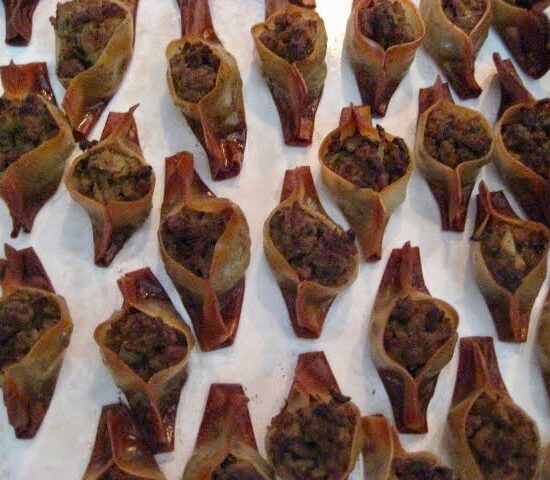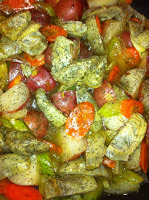I’ve been having an e-discussion about my paternal
grandmother’s keebah dish with my Aunt Zabelle (affectionately known as Zippi), the last remaining relative
from my father’s immediate family. It’s important for me to tap into her memory
bank in order to preserve some mighty-fine Dikranagerdtsi recipes.
grandmother’s keebah dish with my Aunt Zabelle (affectionately known as Zippi), the last remaining relative
from my father’s immediate family. It’s important for me to tap into her memory
bank in order to preserve some mighty-fine Dikranagerdtsi recipes.
 |
| My aunt, Zabelle Dabbakian-Keil
|
 |
| My paternal grandmother, Haiganoush Dabbakian, Aunt Zippi’s and my dad’s mom |
Definitions:
Keebah: stuffed tripe
Tripe: the stomach lining of lamb,
beef, or pork.
beef, or pork.
I have childhood memories of visiting Haiganoush Nanny and
having a feast of Armenian dishes my father and aunts grew up on. One of those
was Keebah – the real deal, meaning ground lamb, bulgur, fresh mint, and seasonings
stuffed in a pouch fashioned out of tripe.
having a feast of Armenian dishes my father and aunts grew up on. One of those
was Keebah – the real deal, meaning ground lamb, bulgur, fresh mint, and seasonings
stuffed in a pouch fashioned out of tripe.
Were the kids told what the outer layer was? Nope, we just
ate it and thought it was pretty darn good!
ate it and thought it was pretty darn good!
Aunt Zippi relayed the following method of Haiganoush Nanny’s
Keebah recipe:
Keebah recipe:
“Nanny used bulgur, meat, fresh mint, seasonings and tripe,
just as you remembered. I have no measurements, just use your own judgement.
Although as I recall there was more bulgur (which was the medium size) than
meat. The mint was very finely chopped so you had the taste of it and not any
of the pieces. The seasonings were as desired but she did add just a pinch of
cayenne to give it a little “kick”. She also used **Nalbandian’s
cleaned, white tripe “seeghoch” (sausage) and large tripe (cow’s
intestine) which she stuffed. (See NOTE below for information on tripe.) Then
with sterilized needle and thread (!) she would sew up the tripe’s opening to
secure it so the stuffing wouldn’t come out in the cooking. Let me add at this
point, when we were kids, we just ate the tripe since it was so delicious never
knowing what it was, it just tasted so fine. That was the stuffed keebah. When
she made it without the tripe, which was often, she just made the mixture into
meatballs and cooked it in chicken broth.
Of course, in the cooking the bulgur expanded and held the meat and
seasonings in place. When serving it,
Nanny would always cut up a nice onion, or crisp green scallions placed on the
plate to go along with the keebah.”
just as you remembered. I have no measurements, just use your own judgement.
Although as I recall there was more bulgur (which was the medium size) than
meat. The mint was very finely chopped so you had the taste of it and not any
of the pieces. The seasonings were as desired but she did add just a pinch of
cayenne to give it a little “kick”. She also used **Nalbandian’s
cleaned, white tripe “seeghoch” (sausage) and large tripe (cow’s
intestine) which she stuffed. (See NOTE below for information on tripe.) Then
with sterilized needle and thread (!) she would sew up the tripe’s opening to
secure it so the stuffing wouldn’t come out in the cooking. Let me add at this
point, when we were kids, we just ate the tripe since it was so delicious never
knowing what it was, it just tasted so fine. That was the stuffed keebah. When
she made it without the tripe, which was often, she just made the mixture into
meatballs and cooked it in chicken broth.
Of course, in the cooking the bulgur expanded and held the meat and
seasonings in place. When serving it,
Nanny would always cut up a nice onion, or crisp green scallions placed on the
plate to go along with the keebah.”
** Hagop Nalbandian, my husband’s great uncle owned a grocery store in Union City, NJ which catered to the needs of the area’s Armenian community.
NOTE: According to information
found in ‘The Assyrian Cookbook’, fresh lamb stomach is no longer available in
our markets. By ‘fresh’, I refer to stomach that comes directly from the
animal. The coating on the outside had to be scraped and cleaned before it
could be prepared for stuffing.
found in ‘The Assyrian Cookbook’, fresh lamb stomach is no longer available in
our markets. By ‘fresh’, I refer to stomach that comes directly from the
animal. The coating on the outside had to be scraped and cleaned before it
could be prepared for stuffing.
Today, tripe is cleaned, processed, frozen, then sawed into
small blocks making it hard to find pieces of tripe large enough to make
keebah.”
small blocks making it hard to find pieces of tripe large enough to make
keebah.”
Can’t stomach tripe? (Pun intended! J)
My departed aunt Arpie, also of Dikranagerdtsi descent,
gave me her shortcut recipe called ‘Sud Keebah’, which I posted several years
ago. The only difference between Aunt Arpie’s and my grandmother’s Sud Keebah recipe is that Arpie used dried mint; Nanny used fresh.
gave me her shortcut recipe called ‘Sud Keebah’, which I posted several years
ago. The only difference between Aunt Arpie’s and my grandmother’s Sud Keebah recipe is that Arpie used dried mint; Nanny used fresh.
Here it is again, for your dining pleasure, without the
tripe!
tripe!
 |
| Aunt Arpie’s Sud Keebah |
Sud Keebah
A recipe from my aunt, Arpie Vartanesian
Serves 4
Ingredients:
1 lb. ground lamb, beef or turkey (Aunt Arpie always said,
“For best results use lamb!”)
“For best results use lamb!”)
1/3 c. #2 bulgur
Salt, pepper, and paprika to taste
Handful of dried mint, crushed
A little water to moisten
Directions:
1. In a small bowl, add the bulgur and 1 or 2 tablespoons
of water, just so bulgur starts to absorb the water.
of water, just so bulgur starts to absorb the water.
2. Combine the meat, bulgur, seasonings and mint, mixing
well with your hands. Dip your hands in the additional water to shape meat
mixture into patties, slightly rounded on the top and flat on the bottom -or –
if you prefer, into meatball shapes. This makes about 12 to 14 walnut-sized
pieces.
well with your hands. Dip your hands in the additional water to shape meat
mixture into patties, slightly rounded on the top and flat on the bottom -or –
if you prefer, into meatball shapes. This makes about 12 to 14 walnut-sized
pieces.
3. In a large pot, bring about 8 cups of water (or broth) to a boil;
add 2 tsp. salt.
add 2 tsp. salt.
4. Place meat patties in boiling water; reduce heat to
medium and cook for 35 to 45 minutes. Remove patties from water.
medium and cook for 35 to 45 minutes. Remove patties from water.
5. Serve in a bowl with some of the cooking liquid, and
sliced raw onions. A chopped salad and fresh, plain yogurt will round out this
dish nicely.
sliced raw onions. A chopped salad and fresh, plain yogurt will round out this
dish nicely.
(Visited 572 times, 1 visits today)





Of course… frying the sliced sud keebah in egg and crisco vegetable shortening is delicious… and terribly unhealthy. My grandmothers used to make it often. I make it each year for my Christmas party. My Odar friends can't get enough of it. Even the ones who claim they HATE lamb.
Love it, GTAK! Thanks for sharing!